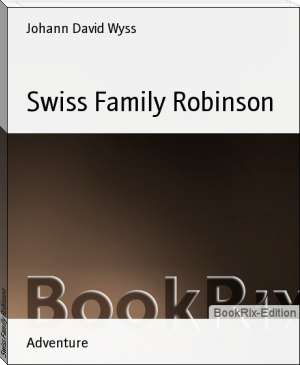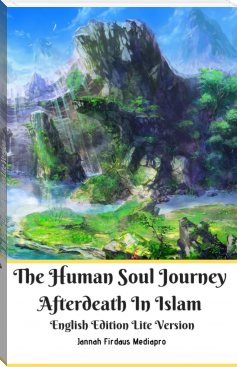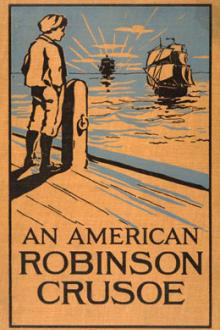Swiss Family Robinson, Johann David Wyss [tools of titans ebook txt] 📗

- Author: Johann David Wyss
- Performer: -
Book online «Swiss Family Robinson, Johann David Wyss [tools of titans ebook txt] 📗». Author Johann David Wyss
In the interval we devoted our attention to the ostrich. But our
efforts on behalf of his education seemed all in vain. He appeared as
untameable as ever. I determined, therefore, to adopt the plan which
had subdued the refractory eagle.
The effect of the tobacco fumes almost alarmed me. The ostrich sank to
the ground and lay motionless. Slowly, at length, he arose, and paced
up and down between the bamboo posts. He was subdued, but to my dismay
resolutely refused all food. I feared he would die; for three days he
pined, growing weaker and weaker each day.
`Food he must have!’ cried I. `Food he must have!’
My wife determined to attempt an experiment. She prepared balls of
maize flour, mixed with butter. One of these she placed within the
bird’s beak. He swallowed it, and stretched out his long neck, looking
inquiringly for a second mouthful. A second, third, and fourth ball
followed the first. His appetite returned, and his strength came again.
All the wild nature of the bird had gone, and I saw with delight that
we might begin his education as soon as we chose. Rice, guavas, maize
and corn he ate readily—`washing it down’, as Jack expressed it, with
small pebbles, to the great surprise of Franz, to whom I explained that
the ostrich was merely following the instinct common to all birds; that
he required these pebbles to digest his food, just as smaller birds
require gravel.
After a month of careful training, our captive would trot, gallop, obey
the sound of our voice, feed from our hand; and, in fact, showed
himself perfectly docile. Now our ingenuity was taxed to the utmost.
How were we to saddle and bridle a bird? First, for a bit for his beak.
Vague ideas passed through my mind, but every one I was obliged to
reject. A plan at length occurred to me. I recollected the effect of
light and its absence upon the ostrich, how his movements were checked
by sudden darkness, and how, with the light, power returned to his
limbs.
I immediately constructed a leathern hood, to reach from the neck to
the beak, cutting holes in it for the eyes and ears. Over the
eyes-holes I contrived square flaps or blinkers, which were so
arranged with whalebone springs that they closed tightly of
themselves. The reins were connected with these blinkers, so that the
flaps might be raised or allowed to close at the rider’s pleasure.
When both blinkers were open, the ostrich would gallop straight ahead;
close his right eye and he turned to the left, close his left and he
turned to the right, shut both and he stood stock still.
I was justly proud of my contrivance, but, before I could really test
its utility, I was obliged to make a saddle. After several failures, I
succeeded in manufacturing one to my liking and in properly securing
it; it was something like an old-fashioned trooper’s saddle, peaked
before and behind—for my great fear was lest the boys should fall.
This curious-looking contrivance I placed upon the shoulders as near
the neck as possible, and secured it with strong girths round the wings
and across the breast, to avoid all possibility of the saddle slipping
down the bird’s sloping back.
I soon saw that my plan would succeed, though skill and considerable
practise was necessary in the use of my patent bridle. It was difficult
to remember that to check the courser’s speed it was necessary to
slacken rein, and that the tighter the reins were drawn, the faster he
would fly. We at length, however, all learned to manage Master
Hurricane, and the distance between Rockburg and Falconhurst was
traversed in an almost incredibly short space of time. The marvellous
speed of the bird again revived the dispute as to the ownership, and I
was obliged to interfere.
`Jack shall retain the ostrich,’ said I, `for it is most suited to him;
he is a lighter weight than either of you his elder brothers, and Franz
is not yet strong enough to manage such a fleet courser. But he is so
far to be considered common property, that all may practise on him
occasionally; and, in a case of necessity, anyone may mount him.’
Our field-work was by this time over. The land had been ploughed and
sown with wheat, barley, and maize. On the other side of Jackal River
we had planted potatoes and cassava roots, and all sorts of other seeds
had been carefully sown.
We had not neglected the ostrich’s eggs, and one day Fritz introduced
me with great glee to three little ostriches. But alas, the little
creatures were not destined to enjoy life for long. One died almost as
soon as it was hatched, and the others, after tottering about on their
stilt-like legs for a few days, followed its example.
I now found time to turn my attention to the bears’ skins, which
required preparation before they would be fit for use as leather. They
had been salted and dried, and now required tanning. I had no tan,
however. This was unfortunate; but not to be deterred from my purpose,
I determined to use a mixture of honey and water in its place.
The experiment proved successful. When the skins were dried they
remained flexible and free from smell, while the fur was soft and
glossy.
This was not the only result of the experiment, for the honey-water
which I boiled appeared so clear and tempting, that it struck me that I
might prepare from it an excellent drink. I put by some of the liquid
before making use of it as tan, and reboiled it with nutmeg and
cinnamon. The preparation, which much resembled English mead, was
pronounced delicious, and my wife begged me to brew a large supply. As
our cellar was now well stocked with provisions for the winter, and our
other preparations were completed, I was able to turn my attention to
details of lesser importance.
The boys had been clamouring for hats, and as my success in so many
trades had surprised me, I agreed to turn hatter for the nonce. With
the rat-skins and a solution of india-rubber, I produced a kind of
felt, which I dyed a brilliant red with cochineal, and stretching this
on a wooden block I had prepared, I passed over it a hot iron, to
smooth the nap, and by next morning had the satisfaction of presenting
to my wife a neat little red Swiss cap, to be lined and finished by her
for one of the boys.
My wife admired the production immensely, and lining it with silk,
added yet more to its gay appearance, by adorning it with ribbons and
ostrich feathers, and finally placed it upon the head of little Franz.
So delighted was everyone with the hat, that all were eager to be
similarly provided, and begged me to manufacture more. I readily
agreed to do so, as soon as they should furnish me with the necessary
materials, and advised them to make half a dozen rat-traps, that they
might secure the water rats with which the stream abounded, and whose
rich glossy fur would serve admirably for felt.
Every fifth animal that they brought me I told them should be mine,
that I might obtain material for a hat for myself and their mother. The
boys at once agreed to this arrangement, and began the manufacture of
the traps, which were all so made that they should kill the rats at
once, for I could not bear the idea of animals being tortured or
imprisoned.
While they were thus engaged I applied myself to the manufacture of
porcelain. I first cleaned the pipe-clay and talc from all foreign
substances, and made them ready to be beaten down with water into a
soft mass, and then prepared my moulds of gypsum plaster. These
preparations were at length made, and the moulds received a thin layer
of the porcelain material. When this was partly baked, I sprinkled over
it a powder of coloured glass beads which I had crushed, and which
looked very pretty in patterns upon the transparent porcelain.
Some of my china vessels cracked with the heat of the stove, some were
very ill-shaped; but, after many failures, I succeeded in producing a
set of white cups and saucers, a cream-jug, a sugar-basin, and half a
dozen small plates.
I must allow that my china was far from perfect; the shape of some of
the vessels was faulty, and none were really transparent;
nevertheless, the general appearance gave great satisfaction, and when
the plates were filled with rosy and golden fruit resting on green
leaves, and fragrant tea filled the cups, it greatly added to the
appearance of the table.
Scarcely had I completed my pottery, when great black clouds and
terrific storms heralded the approach of another winter. The rainy
season having set in, we were compelled to give up our daily
excursions.
Even in the spacious house which we now occupied, and with our varied
and interesting employments, we yet found the time dragging heavily.
The spirits of all were depressed, and even occasional rapid rides,
during a partial cessation of the rain, failed permanently to arouse
them. Fritz, as well as I, had perceived this, and he said to me:
`Why, father, should we not make a canoe, something swifter and more
manageable than those vessels we as yet possess? I often long for a
light skiff, in which I might skim over the surface of the water.’ The
idea delighted all hands, but my wife, who was never happy when we were
on the sea, declared that our chances of drowning were, with the
pinnace and canoe, already sufficiently great, and that there was not
the slightest necessity for our adding to these chances by constructing
another craft which would tempt us out upon the perfidious element.
Her fears were, however, speedily allayed, for I assured her that the
boat I intended to construct should be no flimsy cockleshell, but as
safe and stout a craft as ever floated upon the sea. The Greenlander’s
cajack I intended to be my model, and I resolved not only to occupy the
children, but also to produce a strong and serviceable canoe—a
masterpiece of art.
The boys were interested, and the boat-building was soon in operation.
We constructed the skeleton of whalebone, using split bamboo canes to
strengthen the sides and also to form the deck, which extended the
whole length of the boat, leaving merely a square hole in which the
occupant of the canoe might sit.
The work engrossed our attention most entirely, and by the time it was
complete the rain had passed away and the glorious sun again shone
brightly forth.
Our front door was just wide enough to admit of the egress of our
boat, and we completed her construction in the open air. We quickly
cased the sides and deck with sealskin, making all the seams
thoroughly watertight with caoutchouc.
The cajack was indeed a curious-looking craft, yet so light that she
might be lifted easily with one hand, and when at length we launched
her she bounded upon the water like an india-rubber ball. Fritz was
unanimously voted her rightful owner, but before his mother would hear
of his entering the frail-looking skiff she declared that she must
contrive a swimming-dress, so that `should his boat receive a puncture
from a sharp rock or the dorsal fin of a fish and collapse, he might
yet have a chance of saving his life’.
Though I did not consider the cajack quite the soap bubble my wife
imagined it, I yet





Comments (0)